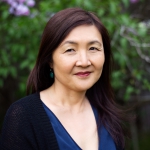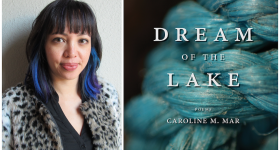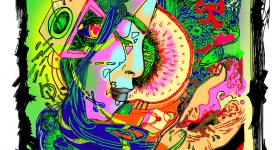At age 32, Michael Seidlinger is about to drop his 10th novel (he also has a poetry collection and a best-selling nonfiction book that was published last year). His latest, titled My Pet Serial Killer, explores the boundaries of power and the need for human connection. Seidlinger uses inventive chapter headings and a variety of formats to usher in a reading experience that is part confession, part television script, part instruction manual and part academic paper, to bring us into the mind and soul of Claire Wilkenson, a college student studying the psychology of serial killers.
Jimin Han: In your new novel, My Pet Serial Killer, your main character, Claire Wilkenson, pushes boundaries on identity but not in the ways we might have seen before.
Michael J Seidlinger: I think every single book I write about is about identity. When I write about identity, I write about the most unique elements of identity. Gender, race, sex; I could go on.
JH: Can you tell us about where you grew up?
MJS: Typical middle-class America. I'm Filipino. But as a kid, I ran away from that culture a bit, trying to undersell it, trying to hide it. I did have a lot of relatives and they had children, of course, so I had cousins around all the time. But I was always the one that wanted to get McDonald's instead of eating pancit or adobo. Instead of actually embracing the culture, I ran away. But when I was in grad school, that's where I finally started to realize it's foolish and at the same time, I guess I realized it made sense that I just felt different. But it took me a long time and it took a lot of hiding. I’d have something to contribute to a conversation but instead I’d be quiet. Or pretend to agree with someone just to fit in. All that changed around the same time that I started to embrace being Filipino.
JH: Was there something that happened to bring that about?
MJS: I'm trying to remember exactly. I had no idea for a period of time what I was meant to do. During that time, I started to do all this soul-searching. A lot of those days where you know that there's nothing to fill it. You're just kind of like, Yes. I know I'm useless. I'm just completely stalled. As I stalled, I started to explore. I started to remove layers and masks — just bailing and running away from elements of myself, which, I guess, we all do, but I think I just had a crisis of it. I didn't want to be who I was. I'd rather be nothing than me.
JH: I think a lot of people are able to relate.
MJS: I can only be myself, and if I have haters, which I do — we all do — everyone does. For every person that you connect with, there are people that you don't connect with. I've always wanted to be the person that gets along with everybody. Some people hate you. It’s difficult to really understand and embrace this. I'm still working on it. Especially now.
JH: Being a minority in the country, the survival instinct to get along comes up a lot.
MJS: I learned from my mom and my aunts that you have to be able to do everything. You can’t count on anyone else to do the work, so you need to be able to do it all. Not only that, but you're expected to do it all and not worry about it. Have a full-time job? So what, you can fit in two other jobs. It’s fine because it’s expected of you and that's part of your identity. But what if it isn't?
JH: Speaking of masks and layers, your new novel has a character who hides quite a bit and seeks connection, however hard it is to look at. What are you saying about human nature?
MJS: I was far more grim and disaffected about love and connection when I wrote My Pet Serial Killer. I mean, to some degree, I still think there’s a methodical element to why we get to know someone, or how every single interaction, every single friendship, involves a cost-benefit analysis that we all run and it influences our agenda for getting to know that person. It's not always transactional but quite often it is. Early on in the book, there's a scene in a nightclub where Claire is using the very same cost-benefit analysis, her agenda being put into practice. She’s looking for someone that’s her type, but more so someone she can take home, someone that might just try to kill her.
JH: Claire, your main character, holds so many contradictions. The word that comes up again and again in your book is mystery. She protects herself emotionally — clearly this whole line of past relationships, her past pets, says something about her pain and rage.
MJS: Her concept of love is very much about risking everything. You risk it all, when wanting to be with a person. It takes being unconditionally vulnerable. Love is a four-letter word but it's the subject of our being. I think, as humans, we’re trying to figure it out. And I think yes, I — yes, I think love is real, but a lot of people don't know how to process it. Claire knows what she wants but grows disillusioned with finding her match.
JH: Have you written a book from the point of view of a woman before?
MJS: No. It just happened. Claire arrived readymade. Her voice, the quality of her character, happened organically, as if she escaped some inner sanctum of my mind. She was always a character who initially would seem unassuming but really is far more complex than what people would initially see.
JH: That complexity comes through. She’s such an expert but she’s also a student at a university, going to classes and not an expert at all.
MJS: I was a student at the time at the University of Central Florida. I took a sociology class. It might have been Deviant Behavior. It was interesting to discover a science that tries to explain insanities, like the various insanities and madness of the society itself.
JH: The novel is structured in an unusual way. The overall effect for me was of a prism.
MJS: For me, I viewed the structure initially as verses in a song. Metaphorically, I looked at it as one long epic, with each italicized scene (the optional ones) being hidden layers of sound; the sections and scenes themselves being verses and occasional breakdowns that build up to one big song. They're like notes in a long sweeping crescendo.
JH: I love to see innovation like that in a book. Can you talk more about your writing process?
MJS: I need music to write. I usually have like one or two artists that I listen to, and it's got to be instrumental. Because I can't write to vocals. I’ve tried. It's not even about the project, really. It's just whatever I'm listening to at the time seems somewhat fresh but familiar. Basically, it's specific to that particular time in my life. Like, right now, I’ve returned to Godspeed You! Black Emperor’s latest album, Luciferian Towers, and that's been working well for me. I usually have a visual component, too. It never actually ends up becoming the cover of the book, obviously, but I always design a prospective cover that I add to my outline and notes. I scroll through those whenever I'm just zoning out and not able to get started; they act like anchors, keeping me grounded, centered.
JH: You’ve got 12 books published now, from a range of nonfiction to poetry. Secret to being so prolific? You also are the publisher-in-chief of Civil Coping Mechanisms (CCM) and co-founder of Entropy Magazine, editor at large at Electric Lit and new marketing director at Melville House Press.
MJS: I find confidence in always doing something, aka I’m a textbook workaholic. As writers, we’re always doubting ourselves, but the one thing I’ve discovered that helps is to structure through the doubt. It helps to know how many chapters, how many acts, what the actual spine of the book will be, while at the same time keeping it loose enough that I can go in and get lost in the details. I need to have a playground to play in. If I give myself too many specifics, I’ll nullify any interest I had in the piece. That element of surprise is important. By creating an exact point for point outline, it feels like nullifying the story before I can even write it.
JH: That's great. Tell us a little bit about what's next. What we can look forward to?
MJS: I have a few projects in the pipeline. They’re already in manuscript form, and I'm going back and trying to figure out how to pitch them. One is nonfiction. The other is a novel. I’m actually happy to be in that space now where I remember what it feels like to write just because I want to write. To get lost in something. For a long time, I thought about each project based on how it would be as a book, on the shelves, each piece making a career move. I’m allowing myself to recalibrate my writing habits to some extent because I feel as writers we do that. We can’t stick to the same routine. We have reason to evolve. If we do, we just might keep at this writing thing.










Comments